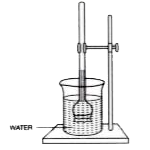Why are the plants raised through micropropagation termed somaclones ?
(b) Mention two advantage of this technique .
Step-by-Step Solution:
1. Definition of Micropropagation: Micropropagation is a tissue culture technique that allows for the rapid multiplication of plants. It involves taking a small piece of plant tissue (such as a leaf or stem) and placing it in a controlled environment to grow into a new plant.
2. Understanding Somaclones: The plants that are raised through micropropagation are referred to as somaclones. This term is derived from the word "soma," which means body. Somaclones are genetically identical to the parent plant because they originate from a single somatic cell or tissue.
3. Genetic Identity: Since all the plants produced through micropropagation are clones of the original plant, they share the same genetic makeup. This genetic uniformity is what classifies them as somaclones.
4. Advantages of Micropropagation:
- Advantage 1: One major advantage of micropropagation is that it allows for the rapid production of a large number of plants in a short period. This is particularly beneficial for commercial agriculture and horticulture.
- Advantage 2: Another advantage is that micropropagation can produce healthier plants that are disease-free and pest-resistant. This is crucial for ensuring higher survival rates and better yields.
Final Answer:
(a) The plants raised through micropropagation are termed somaclones because they are genetically identical to each other and to the parent plant.
(b) Two advantages of this technique are:
1. It allows for the rapid propagation of a large number of plants in a short time.
2. It produces healthier plants that are disease-free and pest-resistant.
---
- Advantage 1: One major advantage of micropropagation is that it allows for the rapid production of a large number of plants in a short period. This is particularly beneficial for commercial agriculture and horticulture.
- Advantage 2: Another advantage is that micropropagation can produce healthier plants that are disease-free and pest-resistant. This is crucial for ensuring higher survival rates and better yields.
(a) The plants raised through micropropagation are termed somaclones because they are genetically identical to each other and to the parent plant.
(b) Two advantages of this technique are:
1. It allows for the rapid propagation of a large number of plants in a short time.
2. It produces healthier plants that are disease-free and pest-resistant.
Topper's Solved these Questions
- XII BOARDSBOOK - XII BOARD PREVIOUS YEAR PAPER ENGLISHCHAPTER - XII BOARDSEXERCISE - Set-I
143 Videos
- XII BOARDSBOOK - XII BOARD PREVIOUS YEAR PAPER ENGLISHCHAPTER - XII BOARDSEXERCISE - SET-III
46 Videos
- SAMPLE PAPER 2019BOOK - XII BOARD PREVIOUS YEAR PAPER ENGLISHCHAPTER - SAMPLE PAPER 2019EXERCISE - Section E Part B
3 Videos
Similar Questions
Mention two advantages of hydroponics.
View SolutionMention two advantages of cross-pollination.
View SolutionMention two advantages of rain-water harvesting.
View SolutionWhat are biopesticides? Mention their two advantages.
View SolutionWhy are microbes like Spirulina being produced on a commercial scale ? Mention its two advantages.
View SolutionAssertion : - All the plants arise through tissue culture are somaclones.
Reason : - All the plants arise through tissue culture are genetically identical.
View SolutionThe diagram given below represents an experimental set-up to demonstrate a vital process. Study the same and then answer the questions that follow :

Mention two advantages of this process to the plant.
View SolutionMurashige and Skoog's medium is used for
(a) Bacterial cultures
(b) Raising plants through micropropagation
(c) Culture of Spirulina
(d) Isolation of fungal strains
View Solution(a) Explain the different ways apomictic seeds can develop. Give an example of each.
(b) Mention one advantage of apomictic seeds to farmers.
(c ) Draw a labelled mature stage of a dicotyledonous embryo.
View SolutionWhat is the major advantage of producing plants by micropropagation ?
View Solution
